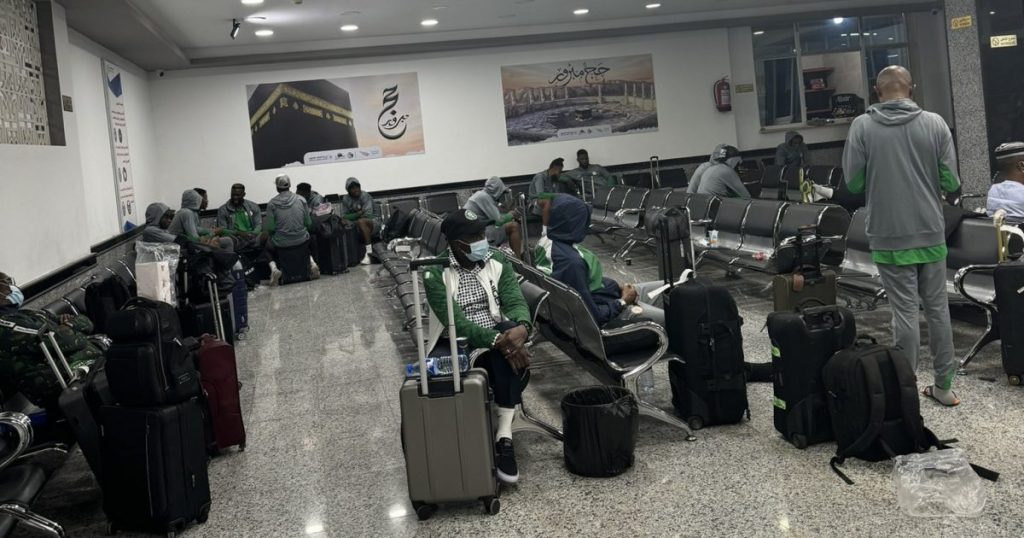The Super Eagles, Nigeria’s national football team, have returned to Malam Aminu Kano International Airport in Kano State after facing significant challenges during their recent travels to Libya for the 2025 African Cup of Nations qualifier. The journey, which began on Sunday, took a difficult turn when their flight was unexpectedly redirected to a remote airport far from their intended destination. This diversion resulted in an unplanned three-hour road trip to reach the venue of the match, causing considerable disruption to their schedule and preparations.
The situation escalated into a more serious ordeal as the team, alongside the pilots and supporting personnel, found themselves stranded at the Libyan airport for over 13 hours. During this time, they were deprived of basic necessities, such as food and water, and were unable to find suitable accommodations where they could rest. Images of the players attempting to rest on benches circulated widely on social media, drawing public sympathy and outrage, particularly from Nigerian authorities who condemned the treatment of the team.
Despite these challenges, the Eagles were eventually granted clearance to board their flight and finally departed Libya. Their arrival in Kano marks the end of a tumultuous journey that has drawn attention not only to the team’s physical struggles but also to the larger implications of international travel logistics for sports teams, especially in politically sensitive regions. The players’ experiences in Libya highlight the unpredictability that can accompany international sporting events and the need for better planning and support systems to mitigate such risks.
The lack of adequate facilities and support for the Super Eagles in Libya has raised questions about the preparedness and infrastructure in place for hosting international matches. It underscores the potential for logistical mishaps that can disrupt not just sporting events, but also the welfare of athletes who dedicate themselves to competing on behalf of their nations. The incident serves as a reminder of the broader issues that can arise in sports governance and the responsibility that host nations have to ensure the safety and comfort of visiting teams.
Moving forward, the Nigerian Football Federation (NFF) may need to advocate for more robust arrangements for their teams traveling abroad, as well as engage in discussions with host nations to ensure the safety and well-being of their players. These efforts are crucial not only to maintain the athletes’ focus on their competition but also to uphold the integrity and spirit of sportsmanship associated with international tournaments. As the Super Eagles prepare for their upcoming matches, it is vital that they receive all the necessary support to perform at their best, free from the concerns of travel-related issues.
In conclusion, the Super Eagles’ ordeal in Libya is a poignant reflection of the complexities involved in international sports travel. The incident has highlighted the vulnerabilities teams can face and the importance of preparedness and diplomacy in sports. As they regroup in Kano State, there is an urgent need for steps to prevent similar situations in the future, ensuring that athletes can concentrate on their performance without the burden of logistical challenges. The Super Eagles’ experience serves as a call to action for all stakeholders involved to prioritize athlete welfare and uphold the values of international sport.














